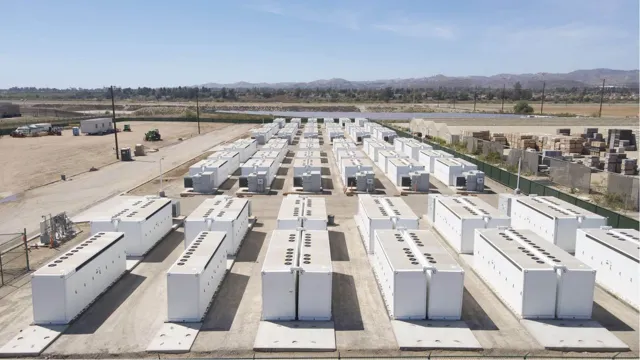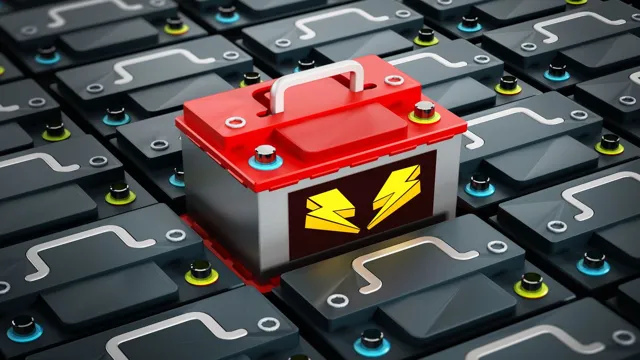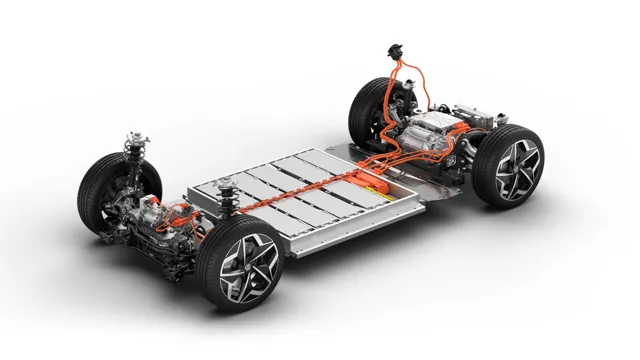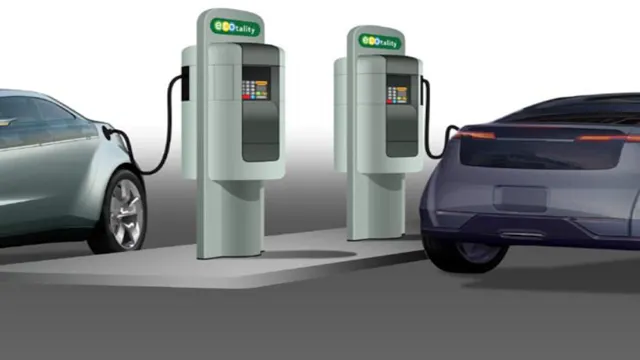Revolutionizing the Future: The Power of Electric Car Battery Storage
Electric cars have been hailed as one of the most significant technological leaps in the automotive industry. While they promise to revolutionize the driving experience, their progress has been limited by the need for efficient and reliable battery storage. In recent years, significant advancements have been made in electric car battery storage technology, which enhances the overall viability of electric cars as a sustainable mode of transportation.
This blog will explore how electric car battery storage works, the different types available, and their benefits and limitations. Join us as we delve into the world of electric car battery storage and discover how it’s transforming the automotive industry.
Why is Battery Storage Important?
Electric car battery storage has become increasingly important as the world seeks to reduce greenhouse gas emissions and move towards sustainable energy sources. Battery storage enables us to store excess renewable energy generated by solar and wind power, which can then be used to power our homes, businesses, and electric vehicles. Without battery storage, energy generated by renewable sources would go to waste if not used immediately.
In the case of electric cars, battery storage allows for longer driving ranges and faster charging times. It also enables electric cars to be used as mobile energy sources that can contribute to the grid during peak demand periods or in emergency situations. As technology continues to improve, battery storage will play a key role in the transition to a more sustainable future.
Increasing Demand for Electric Cars
With the increasing demand for electric cars, battery storage has become an important topic of discussion. Battery storage is crucial to the success of electric cars because it allows for energy to be stored and retrieved at a later time. This is essential for electric cars because they require a constant source of power to run efficiently.
Without battery storage, electric cars would be limited by the amount of power they can hold and would need to be recharged more frequently, making them less practical for everyday use. Battery storage technology has advanced significantly in recent years, allowing for longer-lasting batteries that are more efficient and require less time to charge. This is a significant development for the electric car industry as it offers consumers a more reliable and practical alternative to traditional gasoline-powered vehicles.
As more people make the switch to electric cars, the demand for better battery storage solutions will continue to grow, paving the way for even more innovative and efficient technologies in the future.
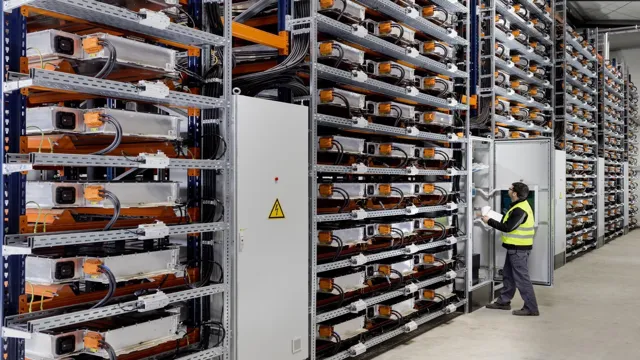
Benefits of Battery Storage
Battery storage has become increasingly important as we shift towards renewable energy sources. One of the biggest advantages of battery storage is its ability to store excess energy when production rates are high and release it during peak demand periods. This not only makes renewable energy more reliable, but it also reduces the need for fossil fuels during high-demand periods, ultimately decreasing greenhouse gas emissions.
Another major benefit of battery storage is its ability to provide backup power during power outages. With extreme weather events becoming more frequent, having reliable backup power systems is crucial. Furthermore, battery storage systems can be used to optimize energy usage by charging during low-demand periods and discharging during high-demand periods, ultimately lowering electricity bills.
Overall, implementing battery storage systems can greatly enhance the efficiency and reliability of renewable energy sources while also providing various economic benefits to consumers.
Types of Electric Car Batteries
When it comes to electric car battery storage, there are a few different types of batteries that manufacturers use. The most common type is the lithium-ion battery, which is lightweight and efficient. These batteries have a high energy density, meaning they can store a lot of energy in a small space, making them perfect for electric vehicles where every inch counts.
Another type of battery that is becoming more popular is the solid-state battery. This battery uses a solid electrolyte instead of a liquid one, making it safer and more efficient than traditional lithium-ion batteries. However, they are still in the development stages, and not yet widely available in consumer vehicles.
Finally, there are lead-acid batteries, which have been around for a long time and are often used in hybrid vehicles. While they are heavier and less efficient than lithium-ion batteries, they are still a good option for some vehicles due to their lower cost and reliability. Ultimately, the type of battery used in an electric car will depend on a variety of factors, including the cost, weight, and energy density required for the specific vehicle.
Lithium-ion Batteries
When it comes to electric car batteries, there are a few different types to choose from. One of the most popular options is the lithium-ion battery. These types of batteries are known for their high energy density, which means they can store a lot of energy in a relatively small space.
They’re also lightweight, making them perfect for use in vehicles. One downside, however, is that they can be prone to overheating and, in some cases, even catching fire. Despite these concerns, lithium-ion batteries are still widely used in electric cars and are considered a safe and reliable option, as long as they’re manufactured and used responsibly.
Nickel-Metal Hydride Batteries
Nickel-Metal Hydride batteries are one of the types of electric car batteries that have been commonly used in the past. They are rechargeable batteries that use hydrogen-absorbing alloy instead of cadmium, a toxic metal found in the Nickel-Cadmium batteries. One of the benefits of Nickel-Metal Hydride batteries is their relatively high energy density, which makes them suitable for use in electric vehicles.
Additionally, they have a lower environmental impact and are less hazardous compared to other battery types. However, they have a shorter lifespan and lower efficiency compared to newer battery technologies, such as Lithium-Ion batteries. Despite being less common in modern electric vehicles, Nickel-Metal Hydride batteries are still being used in some hybrid cars due to their ability to store and discharge energy effectively.
Solid-State Batteries
Solid-state batteries are a new type of electric car battery that are gaining attention due to their potential to replace traditional lithium-ion batteries. These batteries use a solid electrolyte instead of a liquid electrolyte, which offers several advantages, including a higher energy density, faster charging times, and better safety. There are different types of solid-state batteries, including lithium-polymer, sulfide-based, and oxide-based.
Lithium-polymer batteries are the most common type used in electric cars, but sulfide-based and oxide-based batteries are currently being developed. While solid-state batteries are still relatively new, they have the potential to become the standard in electric car batteries in the future. They offer numerous advantages, including increased range, longer lifespan, and improved safety, making them an exciting development in the world of electric vehicles.
Electric Car Battery Storage Solutions
Electric car battery storage is a constantly evolving topic within the electric vehicle industry. One solution to the problem of storing and repurposing used car batteries is to implement second-life applications. These applications involve taking batteries that are no longer suitable for use in cars and repurposing them for stationary energy storage.
This can be achieved by integrating them with renewable energy sources such as solar or wind power to store excess energy during peak production. Another solution is through battery recycling, where the materials from the used batteries are extracted and repurposed for use in new batteries. With advancements in technology and sustainability initiatives, the future of electric car battery storage solutions is looking bright.
V2G (Vehicle-to-Grid)
V2G technology, electric car battery storage solutions Have you ever considered that your electric vehicle could do more than just provide transportation? With V2G (Vehicle-to-Grid) technology, your car battery could also be a solution for energy storage. Essentially, V2G allows for bidirectional energy flow, allowing energy to be transferred from the car’s battery to the grid when there is a shortage and vice versa when there is excess energy. This technology could revolutionize the way we think about energy storage, making electric vehicles not only more environmentally friendly but also more practical and versatile.
Additionally, this could provide incentives for electric vehicle owners, as they could potentially earn money by selling their excess energy back to the grid during high demand times. Overall, V2G has the potential to be a game-changer in the energy industry and further incentivize the adoption of electric vehicles.
Large-Scale Battery Storage Facilities
Electric car batteries are the perfect solution for large-scale battery storage facilities. As more and more people are switching to electric vehicles, there is a growing need for batteries to store energy that can be used when the demand for electricity is high and the supply is low. These batteries are designed to give electric cars enough power to run for hundreds of miles between charges, making them ideal for storing vast amounts of energy.
With advancements in technology, it is now possible to repurpose these batteries for use in large-scale storage facilities. The modular design of these batteries makes it easy to stack them together, creating a single battery that can store the energy required to power entire cities. As a result, electric car batteries are becoming an increasingly popular choice for energy storage solutions, as they are cost-effective, efficient, and eco-friendly.
By harnessing the power of electric car batteries, we can create a brighter, more sustainable future for us all.
Future of Electric Car Battery Storage
The future of electric car battery storage is looking brighter than ever. As technology advances, new breakthroughs are being made in battery technology, allowing for greater storage capacity and longer-lasting life. This means that electric cars can be driven further and for longer periods of time, making them a more viable option for those who commute or travel long distances.
Additionally, charging times are becoming faster and more efficient, reducing the amount of time drivers need to spend at charging stations. As more people adopt electric cars, the demand for better storage technology will only continue to grow, leading to even more advancements in the field. The electric car battery storage industry is rapidly evolving, and it’s exciting to think about what the future may hold for this game-changing technology.
Conclusion
In conclusion, electric car battery storage is like a squirrel hoarding acorns for the winter. Just as the squirrel prepares for the cold months ahead by stashing away food, electric cars rely on their batteries to store energy for the long haul. And just like the clever squirrel, electric car technology is constantly evolving to improve its storage capacity and efficiency.
So let’s keep the momentum going and continue to push the boundaries of electric car battery storage, one acorn – or battery – at a time.”
FAQs
What is electric car battery storage?
Electric car battery storage refers to the ability of an electric car’s battery to store energy that is used to power the car’s motor.
How long does an electric car battery last before it needs to be replaced?
The lifespan of an electric car battery varies depending on the make and model of the car, but typically ranges from 8-10 years or 100,000-200,000 miles before needing to be replaced.
Can electric car batteries be recycled?
Yes, many electric car batteries can be recycled. The materials used in the batteries, such as lithium, can be extracted and used in other products.
Are there ways to increase the lifespan of an electric car battery?
Yes, there are several ways to extend the lifespan of an electric car battery, including avoiding exposure to extreme temperatures, avoiding frequent fast charging, and keeping the battery charged between 20-80% capacity.
